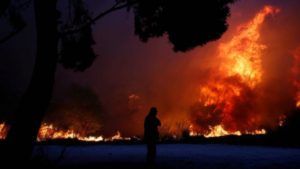The Joint Research Center published the 2018 edition of its Annual Report on Forest Fires in Europe, the Middle East and North Africa. According to this report, wildfires destroyed nearly 178,000 hectares (ha) of forests and land in the EU last year.
Results
The highest numbers of fires of 30 ha or larger were mapped by the European Forest Fire Information System which are the following:
- Italy (147 fires, 14 649 ha burned)
- Spain (104 fires, 12 793 ha burned)
- Portugal (86 fires, 37 357 ha burned)
- the UK (79 fires, 18 032 ha burned)
- Sweden (74 fires, 21 605 ha burned) during last year
While these figures show that this is less than one sixth of the area burnt in 2017, and less than the long-term average, more countries than ever before suffered from large fires.
- Sweden experienced the worst fire season in reporting history. The total burnt area of over 21 605 ha mapped in Sweden was registered as the second highest in the EU, an unusual position in the ranking for a northern country. Although Portugal was again the country with the highest burnt area, its total was a small fraction of the area lost to fire in 2017 and one of the lowest totals of the last 10 years.
- Vulnerable ecosystems of the Natura 2000 network, home to several endangered plant and animal species, lost 50 000 ha to fires, accounting for 36% of the total burnt area in 2018.
- Despite a smaller overall area burnt than in previous years, above average temperatures persisted in central and northern Europe for most of the summer. This created conditions that helped the ignition and spread of forest fires, causing high economic and environmental losses.
In 2018, the EU Civil Protection Mechanism was activated five times to respond to forest fires in Europe: in Sweden, Greece, Latvia, and Portugal.
In total, 15 planes, 6 helicopters and over 400 firefighters were mobilised in the summer, with the European Union having funded €1.6 million in transportation costs to mobilise support to the affected countries.
Furthermore, over 139 Copernicus satellite maps on forest fires were produced on the request of Member States. In addition, the EU sent forest fire experts from across the EU to Portugal on a prevention and preparedness mission to help boost the country’s capacity to deal with forest fires.
Present
In March 2019, the EU upgraded the EU Civil Protection Mechanism and launched rescEU to improve the protection of citizens from disasters and the management of emerging risks in Europe and beyond.
The EU created a transition fleet of firefighting aircraft in the summer of 2019, and deployed it already twice to fight forest fires in Greece and Lebanon.
Additionally, in July, the European Commission called for stepping up EU action on deforestation and forest degradation in a Communication, and committed itself to further action, including the development of the European Forest Fire Information System into a tool for wildfire monitoring on a global scale.
The 2018 edition of the Annual Report on Forest Fires also notes that in 2019 the fire season started early, because of dry and windy conditions, with high temperatures.
Already by March this year, the number of fires was higher than the average for the whole year in the last decade, with numerous fires in mountain regions and critical fires in the Danube delta.
More information
Defence and Security or Environment Section







Leave a Reply